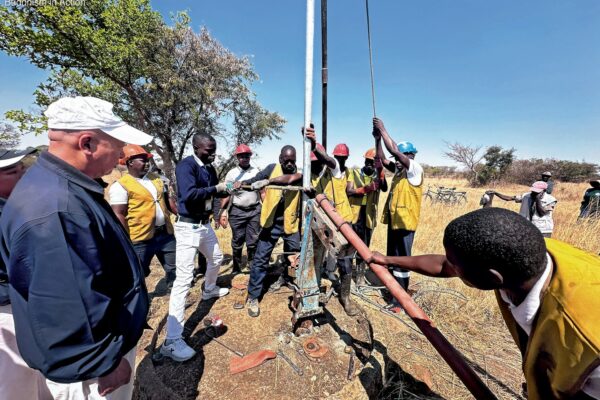Information provided by Huang Lu-fa and Chen Yong-hua
Translated by Wu Hsiao-ting
A third wave of the coronavirus erupted in Myanmar in mid-2021, resulting in a deficiency of oxygen supplies and causing the public to panic. Many Tzu Chi volunteers were also diagnosed with the infection. A shortage of manpower presented a tough challenge as volunteers mobilized to organize and distribute aid. Despite the challenges, they continued to help those in need.
The COVID-19 pandemic in Myanmar took a drastic turn for the worse in June 2021. Hospitals were filled to capacity in a few short days, stretching oxygen supplies thin. Some patients were forced to go into isolation at home and treat themselves with oxygen they had obtained themselves. Outside oxygen-producing factories, long lines of people, disregarding curfews and COVID precautionary protocols, waited anxiously to buy their own private supplies. A sense of panic pervaded society.
Daw Thida Khin (李金蘭), head of Tzu Chi Myanmar, recalled that difficult time. By June and July, the pandemic had pushed the nation’s healthcare system over the brink. The demand for oxygen concentrators and other equipment spiked. People were knocking on the door of the Tzu Chi office, begging for the foundation to provide them with oxygen supplies to save their family. Not long after the surge in cases, many Tzu Chi volunteers themselves were diagnosed with the infection, making it even harder for them to provide relief. “Myanmar has been plagued by natural and man-made disasters since 2008,” said Daw Thida Khin. “With support from Master Cheng Yen and Tzu Chi volunteers around the world, we’ve managed to conduct many large-scale distributions of rice and rice seeds for the needy. Never before have we encountered such difficulties as we did this time in providing assistance to the needy, because many volunteers and their family members also fell victim to the disease.”
Diagnosed cases among volunteers and staffers started popping up in late June. In response, Tzu Chi Myanmar provided isolation space for those volunteers and employees who needed it. Aye Nandar Aung (郭寶鈺), deputy head of Tzu Chi Myanmar, was among those infected. As soon as she recovered, she contacted doctors in her community and arranged treatment for her fellow volunteers who had been diagnosed with COVID-19. When the volunteers had regained their health, they would not go home but instead threw themselves into Tzu Chi’s work. They joined other volunteers to distribute food to the vulnerable. From the time the pandemic started to October 2021, Tzu Chi Myanmar provided enough food to benefit more than 100,000 households.
On July 10, 2021, volunteer U Kyaw Khin (林銘慶) personally visited Yangon Region’s Phaung Gyi Hospital, Myanmar’s largest medical facility for the isolation and treatment of COVID patients. The day after the visit, he applied to Tzu Chi headquarters in Taiwan for a large amount of oxygen concentrators and cylinders to help Myanmar ride out the challenges posed by the pandemic. The application was instantly granted. U Kyaw Khin followed up by asking Dr. Than Than Aye, the superintendent of Grand Hantha Hospital, to help take care of the import procedures of the medical equipment.
Much to everyone’s surprise, U Kyaw Khin himself was diagnosed with COVID-19 in mid-July. Many of his relatives and friends fell victim to the disease too, one after the other. Some even died. U Kyaw Khin often had trouble falling asleep at night, having witnessed firsthand the suffering caused by the disease and worried about the collapse of the nation’s medical system. He performed rapid COVID-19 testing on himself every day, hoping that the result would eventually come back negative, leaving him free to go out to volunteer and take care of other important business. He only felt a sense of relief when he learned that the medical equipment he had applied for was on its way to Myanmar. “There were no flights available when we first tried to bring in the equipment by air, so we were put on the waiting list. But because the hospitals here desperately needed the equipment, we were really worried. The difficulties we encountered in the process were numerous. It was like fighting a war. You had to be at the ready all the time.”
Even though he could not go out, he didn’t sit around idly. He phoned hospital administrators and government officials every day to determine the number of oxygen concentrators needed and arrange for their transportation. He became even busier after he recovered—constantly taking care of relief work. Though he was very busy, it pleased him more than anything that he could contribute his bit during this difficult time and help relieve suffering.
Eventually, all the 1,759 oxygen concentrators and 658 oxygen cylinders provided by Tzu Chi headquarters arrived in different shipments in Myanmar. They were then delivered to hospitals, isolation centers, and monasteries across the country. Some of the oxygen concentrators were placed in the Tzu Chi office in Yangon to be loaned out to community residents for free. People who borrowed the equipment returned it as soon as they could so that it could be used to save more people. Daw Thida Khin said, “We’ve saved nearly 2,000 people. The value of our equipment is beyond measure.”



